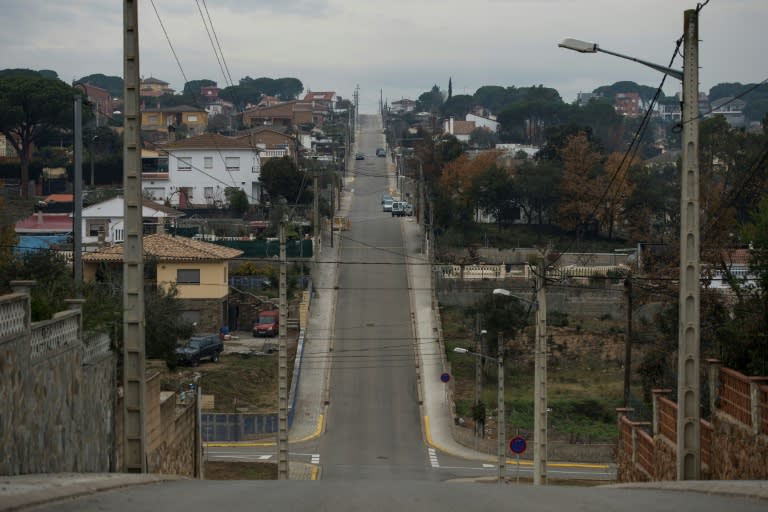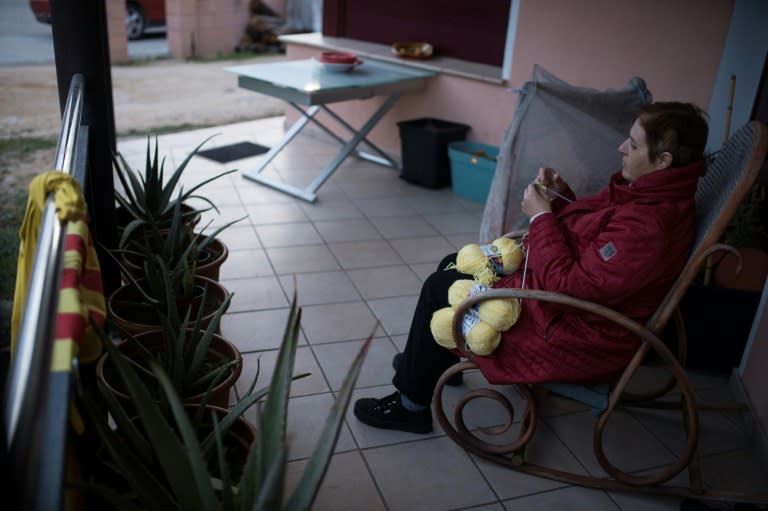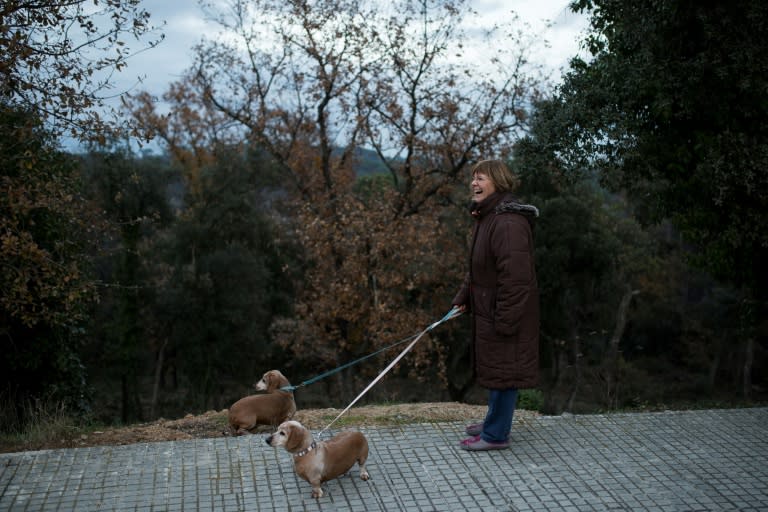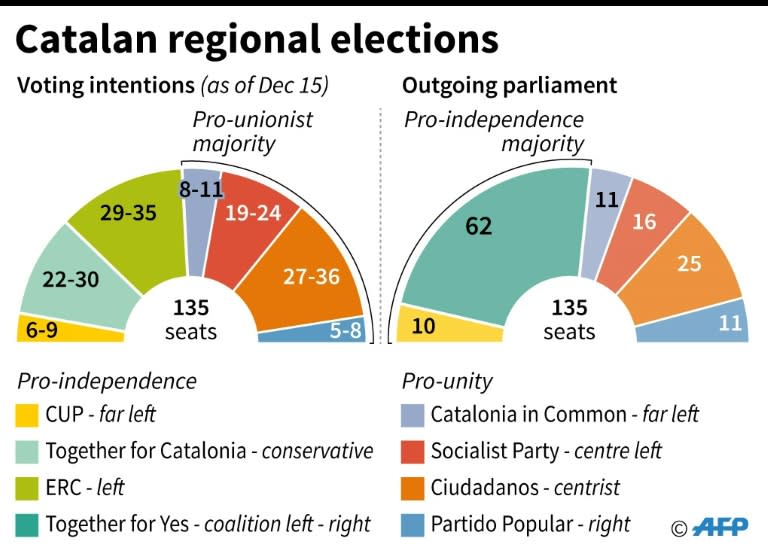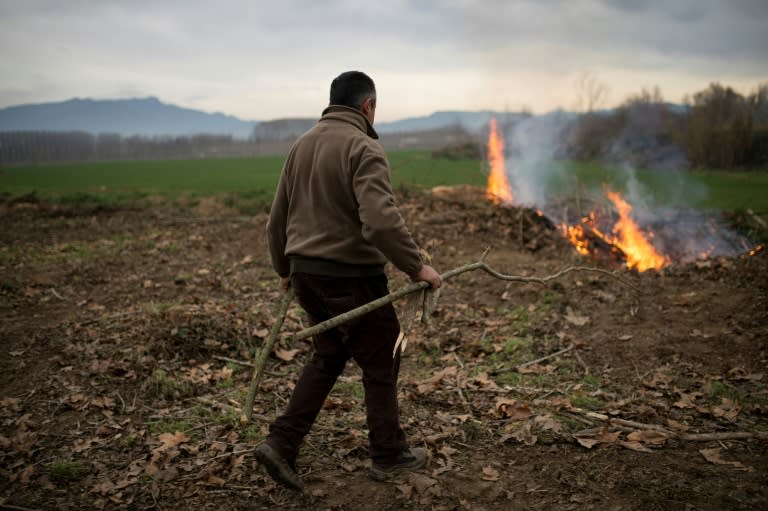Catalan bellwether village predicts separatists will win vote
Sitting at the foot of a mountain and surrounded by forests, the village of Fogars de la Selva has always voted for the winner in Catalan elections, and residents believe the separatists will win again on Thursday. "Fogars de la Selva is Catalonia's Ohio," says the region's Rac1 radio, referring to the US swing state that has almost always voted for the winner in elections. "The person who won in Fogars de la Selva became president in 11 Catalan elections." In the village about 60 kilometres (37 miles) from Barcelona, Isabel Tresseras's new house overlooks "Catalonia Square," a roundabout adorned with the region's "Senyera" flag. In her sitting room, a bowl of chicken broth steams on the table near a Christmas tree, and Tresseras brings out three balls of yellow wool. "I'm knitting a yellow scarf," she says pointedly, yellow being the colour of those protesting against the detention of four separatist leaders pending a probe into sedition and -- for two of them -- rebellion for their role in Catalonia's independence drive. The crisis came to a head on October 27 when the regional parliament declared unilateral independence, though it was short-lived as Madrid promptly suspended Catalonia's autonomy, sacked its government and the new "republic" was not recognised by a single country. - Independence voters loyal - Unemployed since 2009, Tresseras says she is a new convert to independence. In her opinion, if the central government had agreed to negotiate to give Catalonia more power over its finances as requested in 2012, few would be pro-independence now. She will vote "again for (Carles) Puigdemont," Catalonia's separatist president who was sacked by Madrid and fled to Belgium. Isabel's neighbour, Presentacion Espinola -- a 64-year-old Catalan originally from the southern region of Andalusia -- is walking her two sausage dogs, one of which is wearing a sock with the colours of FC Barcelona. She is tossing up between Puigdemont's list and that of Catalonia's deposed vice-president Oriol Junqueras, who is now in jail. According to opinion polls, Junqueras's leftist, secessionist ERC party, and centrist, anti-independence Ciudadanos are neck-and-neck. So all eyes are on this village of 1,452 people to see what its voters will do. In the last regional elections in 2015, the pro-independence coalition led by Puigdemont and Junqueras came first in the village, followed by Ciudadanos and the Socialist party. Two years on, "pro-independence voters aren't going to change their vote," says Violeta Pelaez, 66, retired, and the only Socialist member of a town council dominated by separatists. - Rise of Ciudadanos - Still, she has noticed that "Ciudadanos is rising a lot," while Prime Minister Mariano Rajoy's conservative Popular Party is losing ground. Sitting on his terrace, Javier Lopez says he will vote for Ciudadanos. The 31-year-old bank worker says it is a "youthful" party that hasn't governed yet and is free of corruption "for the time being". He sees Puigdemont's flight to Belgium as "cowardice" after an "inexplicable" independence declaration, given around half of Catalans were against it. Speaking Catalan with his daughters and colleagues, he grumbles that "it's not because you're pro-independence that you're more Catalan than others." - 'They rushed things' - The village consists of a long road bordered by new houses, three housing estates and more than 100 scattered farms. Near the isolated church, Francesc Rabassa is grinding down the stumps of poplars that have been knocked down. The 55-year-old forest worker says he voted for the separatist coalition in 2015, like many farmers. But "they rushed things a little with the unilateral declaration of independence... They were counting on Europe too much and found themselves alone." He would have preferred Puigdemont to give up on this proclamation, which remains symbolic, but says he still has "confidence" in the man he sees as his president. Like many others, Rabassa says he turned to independence after the conservatives came back to power in Madrid in 2011 and would like "dialogue" between both sides and "an intervention by Europe". The grey sky over Fogars appears to match the morose atmosphere. "We're all worried," says Marisa, a 48-year-old gas station employee who wants a change in the regional government.

